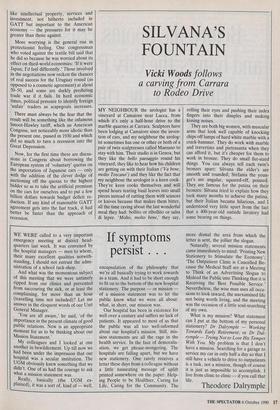If symptoms
persist .
WE WERE called to a very important emergency meeting at district head- quarters last week. It was convened by the hospital managers — men to whom, their many excellent qualities notwith- standing, I should not entrust the admi- nistration of a school tuck-shop.
And what was the momentous subject of this meeting that we were untimely ripped from our clinics and prevented from succouring the sick, or at least the complaining, for more than an hour (travelling time not included)? Let me answer in the eloquent words of our Unit General Manager. 'You are all aware,' he said, 'of the importance in the present climate of good public relations. Now is an appropriate moment for us to be thinking about our Mission Statement.'
My colleagues and I looked at one another in bewilderment. Up till now we had been under the impression that our hospital was a secular institution. The UGM obviously knew something that we didn't. One of us had the courage to ask what a mission statement was.
Really, basically (the UGM ex- plained), it was a sort of, kind of— well, encapsulation of the philosophy that we're all basically trying to work towards as a team. And it had to be short enough to fit on to the bottom of the new hospital stationery. The purpose — or mission — of a mission statement was to let the public know what we were all about: what, in short, our mission was.
Our hospital has been in existence for well over a century and suffers no lack of patients. It appeared to most of us that the public was all too well-informed about our hospital's mission. Still, mis- sion statements are all the rage in the health service. In the face of demoralis- ation, we get phrase-mongering. The hospitals are falling apart, but we have new stationery. One rarely receives a letter these days from a colleague without a little nauseating message of uplift printed somewhere on the paper: Help- ing People to be Healthier, Curing for Life, Caring for the Community. The more dismal the area from which the letter is sent, the jollier the slogan.
Naturally, several mission statements came immediately to mind: 'Printing New Stationery to Stimulate the Economy'; 'The Outpatient Clinic is Cancelled Be- cause the Medical Staff are at a Meeting to Think of an Advertising Slogan to Mislead the Public into Thinking that it is Receiving the Best Possible Service.' Nevertheless, the wise man uses all occa- sions to look inward, the unexamined life not being worth living, and the meeting was the occasion of a little soul-searching of my own.
What is my mission? What statement can I put at the bottom of my personal stationery? Dr Dalrymple — Working Towards Early Retirement; or Dr Dal- rymple — Trying Not to Lose His Temper With You. My problem is that I don't have a mission. Searching for a garage to service my car in only half a day so that I still have a vehicle to drive to outpatients is a task, not a mission, though of course it is just as impossible to accomplish. I live from clinic to clinic — if you call that life.
Theodore Dalrymple


















































 Previous page
Previous page